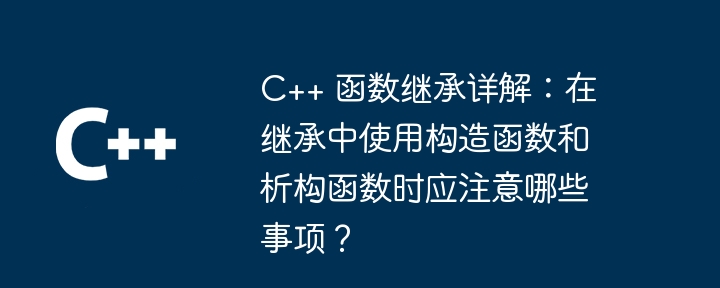
In C inheritance, constructor inheritance requires the first statement of the derived class constructor to call the base class constructor, and destructor inheritance requires the derived class destructor to first execute the derived class code and then call the base class destructor. Pay attention to avoid cyclic calls to constructors and destructors, ensure that the parent class constructor and destructor are implemented correctly, and use the base class pointer to call the parent class destructor.

In C, when a derived class inherits a base class, The behavior of derived class constructors and destructors is affected. This article will discuss in detail the considerations when using constructors and destructors in inheritance, and illustrate it through a practical case.
When a derived class inherits from a base class, the constructor of the derived class calls the constructor of the base class to initialize the member variables of the base class. At this time, you need to pay attention to the following matters:
The destructor of the derived class will perform the following operations:
Consider the following code, which demonstrates the behavior of constructors and destructors in inheritance:
#include <iostream>
using namespace std;
class Base {
public:
Base() {
cout << "Base constructor called." << endl;
}
~Base() {
cout << "Base destructor called." << endl;
}
};
class Derived : public Base {
public:
Derived() {
cout << "Derived constructor called." << endl;
}
~Derived() {
cout << "Derived destructor called." << endl;
}
};
int main() {
Derived d;
return 0;
}Running this code will print the following output:
Base constructor called. Derived constructor called. Derived destructor called. Base destructor called.
When using constructors and destructors in inheritance, you also need to pay attention to the following matters:
The above is the detailed content of Detailed explanation of C++ function inheritance: What should you pay attention to when using constructors and destructors in inheritance?. For more information, please follow other related articles on the PHP Chinese website!
 What are the differences between c++ and c language
What are the differences between c++ and c language
 Recommended learning order for c++ and python
Recommended learning order for c++ and python
 Cost-effectiveness analysis of learning python and c++
Cost-effectiveness analysis of learning python and c++
 Is c language the same as c++?
Is c language the same as c++?
 Which is better to learn first, c language or c++?
Which is better to learn first, c language or c++?
 The difference and connection between c language and c++
The difference and connection between c language and c++
 C++ software Chinese change tutorial
C++ software Chinese change tutorial
 Cost-effectiveness analysis of learning python, java and c++
Cost-effectiveness analysis of learning python, java and c++




